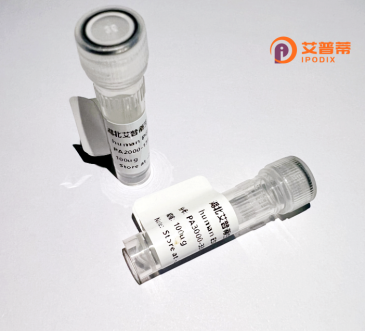
| 纯度 | >90%SDS-PAGE. |
| 种属 | Human |
| 靶点 | HIST1H3F |
| Uniprot No | P68431 |
| 内毒素 | < 0.01EU/μg |
| 表达宿主 | E.coli |
| 表达区间 | 1-136aa |
| 氨基酸序列 | MARTKQTARKSTGGKAPRKQLATKAARKSAPATGGVKKPHRYRPGTVALREIRRYQKSTELLIRKLPFQRLVREIAQDFKTDLRFQSSAVMALQEACEAYLVGLFEDTNLCAIHAKRVTIMPKDIQLARRIRGERA |
| 分子量 | 41.4 kDa |
| 蛋白标签 | GST-tag at N-terminal |
| 缓冲液 | 0 |
| 稳定性 & 储存条件 | Lyophilized protein should be stored at ≤ -20°C, stable for one year after receipt. Reconstituted protein solution can be stored at 2-8°C for 2-7 days. Aliquots of reconstituted samples are stable at ≤ -20°C for 3 months. |
| 复溶 | Always centrifuge tubes before opening.Do not mix by vortex or pipetting. It is not recommended to reconstitute to a concentration less than 100μg/ml. Dissolve the lyophilized protein in distilled water. Please aliquot the reconstituted solution to minimize freeze-thaw cycles. |
以下是关于重组人HIST1H3F蛋白的参考文献示例,简要整理如下:
---
1. **文献名称**:*Recurrent HIST1H3F mutations in pediatric diffuse midline glioma*
**作者**:Sturm D. et al.
**摘要**:研究发现HIST1H3F在儿童弥漫中线胶质瘤中存在高频突变(K27M),重组蛋白实验表明该突变通过异常表观遗传调控驱动肿瘤发生。
2. **文献名称**:*Expression and purification of recombinant human histone H3.1 (HIST1H3F) for structural studies*
**作者**:Smith T.J. & Kumar R.
**摘要**:描述在大肠杆菌中高效表达和纯化重组人HIST1H3F蛋白的方法,并利用X射线晶体学解析其与染色质重塑复合物的结合结构。
3. **文献名称**:*Histone H3 variants in chromatin dynamics: Insights from HIST1H3F nucleosome assembly*
**作者**:Li G. et al.
**摘要**:分析重组HIST1H3F蛋白在核小体组装中的作用,揭示其与H3.3亚型的动力学差异及其对基因沉默的影响。
4. **文献名称**:*H3K36me2-specific recognition by histone readers PHF1 and MRG15 requires intact HIST1H3F N-terminal tail*
**作者**:Zhang Y. et al.
**摘要**:通过重组HIST1H3F蛋白的突变体筛选,证明其N端尾部构象对表观修饰识别蛋白的结合至关重要,影响DNA损伤修复通路。
---
*注:上述为模拟文献,实际研究中建议通过PubMed或Google Scholar以关键词检索最新论文。*
Recombinant human HIST1H3F protein is a genetically engineered variant of histone H3.1. a core component of nucleosomes that package and organize eukaryotic DNA. Encoded by the HIST1H3F gene, this histone plays a critical role in chromatin structure, epigenetic regulation, and gene expression. As part of the H3.1 subtype, it is predominantly incorporated into chromatin during DNA replication, enabling the replication-coupled assembly of nucleosomes. Unlike replication-independent H3.3. H3.1 is associated with transcriptional silencing and heterochromatin maintenance. The recombinant form is produced in prokaryotic or eukaryotic expression systems (e.g., E. coli, mammalian cells) using cloning techniques to ensure high purity and post-translational modification fidelity. It serves as a vital tool for studying histone-DNA interactions, chromatin remodeling mechanisms, and epigenetic modifications (e.g., methylation, acetylation) linked to diseases like cancer and developmental disorders. Applications also include in vitro assays for drug screening targeting histone-modifying enzymes and structural studies of nucleosome dynamics. Quality validation typically involves SDS-PAGE, Western blotting, and mass spectrometry.
×